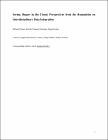| dc.contributor.author | Doran, Michelle | |
| dc.date.accessioned | 2022-05-04T11:15:11Z | |
| dc.date.available | 2022-05-04T11:15:11Z | |
| dc.date.issued | 2022 | |
| dc.date.submitted | 2022 | en |
| dc.identifier.citation | Michelle Doran, Jennifer Edmond, Georgina Nugent Folan, Seeing Shapes in the Cloud: Perspectives from the Humanities on Interdisciplinary Data Integration, Data Science Journal CODATA, 2022 | en |
| dc.identifier.other | Y | |
| dc.identifier.uri | http://hdl.handle.net/2262/98529 | |
| dc.description.abstract | One of the major factors inhibiting interdisciplinary, data-driven research is how to capture provenance
and facilitate the discovery, use, and reuse of discipline specific research data. The growing pressure to
find ways to enable technological and cultural compliance with the nascent European Open Science
Cloud (EOSC) is intensifying what is an already difficult proposition. This paper outlines an approach
based upon the findings of the Knowledge Complexity (KPLEX) project (https://kplex-project.eu/) which
investigated the delimiting effect digital mediation and datafication can have on rich, complex cultural
data. As KPLEX was humanities-led but ICT-funded, the project partners approached this challenge in a
comparative, multidisciplinary and multisectoral fashion. This paper investigates and outlines the wider
lessons to be learned from data reuse practices in the arts and humanities, fields well accustomed to
dealing with complex, hybrid, and noisy data. Understanding the challenges that complex research data
pose to our research infrastructures will help facilitate the transition to a truly open and interdisciplinary
frontier for scientific research and innovation. This paper focuses on the criteria and guidelines for the
recognition and classification of data, both between and within research data infrastructures and research
communities. It describes the ways in which the effectiveness of traditional signposting mechanisms such
as research classification systems, taxonomies, and metadata are weakened in the digital age and sets forth
key policy-relevant findings on how to tackle those issues and maximise the participation of a wider set of
disciplines under the vision of the EOSC. | en |
| dc.language.iso | en | en |
| dc.relation.ispartofseries | Data Science Journal CODATA; | |
| dc.rights | Y | en |
| dc.subject | Data Reuse | en |
| dc.subject | Interdisciplinarity | en |
| dc.subject | Metadata | en |
| dc.subject | Digital Curation | en |
| dc.subject | European Open Science Cloud | en |
| dc.subject | Digital Humanities | en |
| dc.title | Seeing Shapes in the Cloud: Perspectives from the Humanities on Interdisciplinary Data Integration | en |
| dc.type | Journal Article | en |
| dc.contributor.sponsor | European Union (EU) | en |
| dc.type.supercollection | scholarly_publications | en |
| dc.type.supercollection | refereed_publications | en |
| dc.identifier.peoplefinderurl | http://people.tcd.ie/doranm1 | |
| dc.identifier.rssinternalid | 242642 | |
| dc.relation.ecprojectid | info:eu-repo/grantAgreement/EC/FP7/732340 | |
| dc.rights.ecaccessrights | openAccess | |
| dc.contributor.sponsorGrantNumber | 732340 | en |
| dc.subject.TCDTheme | Digital Humanities | en |
| dc.subject.TCDTag | Data management | en |
| dc.subject.TCDTag | Digital Humanities | en |
| dc.subject.TCDTag | Research Data Management | en |
| dc.identifier.orcid_id | 0000-0001-7850-6886 | |
| dc.status.accessible | N | en |




